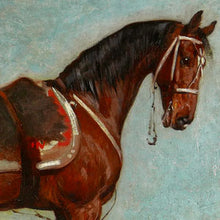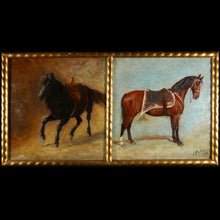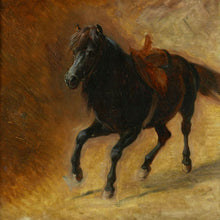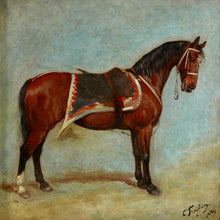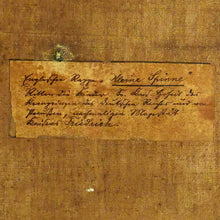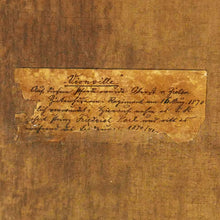Studies of the Chargers of Crown Prince Frederick and Prince Freidrich Karl of Prussia, 1874
- Regular price
- £3,400
- Sale price
- £3,400
- Regular price
-
- Unit price
- /per
Sale
Sold out
Tax included.
Adding product to your cart
Measurements: 39cm (15.5cm) x 76cm (30in)
Oil on canvas. A pair of equestrian studies of the chargers Kleine Spinne and Vionville ridden by cousins Crown Prince Frederick of Prussia and Prince Freidrich Karl of Prussia painted on a single canvas. Labelled verso. Contained in divided gilt wood frame. Signed and dated ‘C. Freyberg 1874’ lower right.
Kleine Spinne (Little Spider) was the charger of Crown Prince Frederick of Prussia (1831-1888), the future Emperor Frederick III of Germany. He married Victoria, the Princess Royal of Great Britain in 1858. Raised in the Hohenzollern military tradition, Frederick was an military commander during the Second Schleswig, Austro-Prussian and Franco-Prussian wars, and was also widely acknowledged for his humanitarian outlook.
Vionville was named for the French town where Prince Friedrich Karl Nikolaus of Prussia (1828-1885) cut off the line of retreat of the 160,000-strong French army of the Rhine with just 30,000 men on 16 August 1870 during the Franco Prussian War. As a military commander, the Prince had a major influence on the Royal Prussian Army's advances in training and tactics in the 1850s and 1860s. He commanded one of the armies which defeated the Austrian army at the Battle of Königgrätz in 1866, and he ultimately oversaw the defeat of the Army of the Rhine at the Siege of Metz in 1870.
Conrad Freyberg (1842-1915) was born in Stettin and trained at the Berlin Art Academy and then entered the studio Carl Steffecks. Both a painter and sculptor, he specialised in historical and contemporary military subjects and genre scenes. He was Art Master at the Berlin court from 1866.
Use left/right arrows to navigate the slideshow or swipe left/right if using a mobile device







